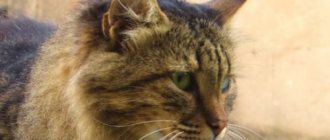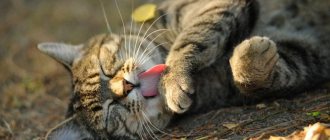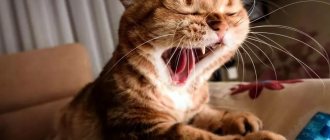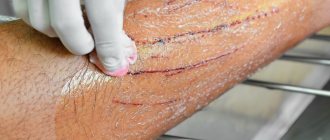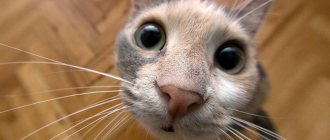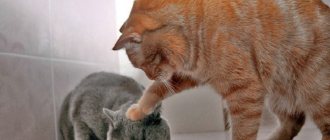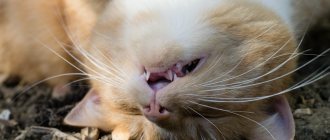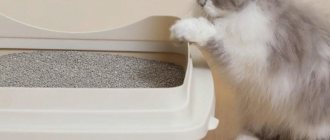Cockroaches, crickets, grasshoppers, ants
As such, these insects are not dangerous to cats, provided that the cat does not ingest them. As for the red-haired kitchen robbers, then, of course, it is better to wage a serious fight against them to exterminate them. Cockroaches eat the same food as us, leaving their own excrement everywhere. In addition, these insect pests are carriers of numerous parasites. No one will find it too small – neither cats nor their owners.
Are you friends with cockroaches? Then regularly (much more often than others) examine your cat for worms, worms and other parasites.
Wool lovers
Most often, you can notice how cats eat wool - this is especially typical for furry pets, as well as for cats of “infantile breeds” (Persian, British, Siamese. Also, some felinologists believe that pampered and spoiled cats are distinguished by this habit.
At the same time, cats often eat not only their own fur, but also various fabric products (both woolen and not - carpets, upholstery and even the owners’ clothes), and this tendency is usually explained by the fact that the cat simply likes the smell or texture of the fabric it eats . However, in general, the meaning of such wool-eating has not yet been fully studied, especially since pieces of fabric or the animal’s own fur are not digested and usually do not cause any harm to the animal (only in rare cases do cats suffer from blockage of the intestines or stomach).
There are different ways to rid your cat of a “bad habit.” If the animal is too spoiled and pampered, then the best “cure” would be to limit violent affection and create situations in which the infantile cat would learn to make decisions on its own and be an “adult.” It's also a good idea to hide edible tissues away and encourage your cat to go for walks and play with other animals. Usually, after such measures, the desire to eat wool disappears after a few weeks.
At the same time, if you see that cats are eating wool, despite your attempts to prevent it, you should not cause them discomfort - for example, scream loudly or throw cold water on the “intruders”. This will only lead to the cat starting to hide and look for fur for its “meal” in secluded corners. In this case, the most effective way is to saturate the fabrics that the cat is interested in with an unpleasant substance or repellent (not poisonous!). Usually menthol or eucalyptus products are suitable for such purposes, but it is better not to use hot peppers and sauces - the cat may unexpectedly like them. If the product is chosen correctly, the habit of eating wool disappears the first time.
And finally, another method - you can simply change the cat’s diet: just stop feeding it by the hour, and offer it dry food, which will always be “openly available”. It is quite possible that the animal will ultimately want to chew on it, and not the fur at all.
Fleas, ticks, mosquitoes and flies
Where would we be without these creatures, especially when the sun begins to warm up in earnest? Fleas are common in cats, causing itching, irritation and even anemia. Cats often ingest fleas while washing themselves. Then we wonder: how did my pet “catch” a huge tapeworm? With the onset of the spring-summer season, start protecting your pet from fleas!
Absolutely any cat can pick up ticks, even one that is kept indoors (alas!). Ticks are carriers of serious diseases. You should carefully examine your pet for ticks and consult a veterinarian if necessary. Please check out our publication on ilike.pet.
Mosquitoes and flies are also not always harmless. Both of them can spread all sorts of, excuse the banality, infection. Some flies (gadflies) even lay eggs on the skin of animals, causing the latter a lot of suffering. If you notice something is wrong with your pet, do not take any action yourself - this will only cause harm. Contact qualified help immediately.
Photo: aroundpet.ru (from open sources).
Frequently asked questions about cats
Often cat owners ask questions: why does their pet perform certain actions and what is the reason for this? Here are the answers to some of them.
Why doesn't my pet eat from a bowl, but drags pieces of food onto the floor?
The animal has very sensitive whiskers, and he does not like it when they come into contact with dishes. You can offer your pet a low, wide bowl or accept that he eats from the floor.
Why does an animal crouch when it notices a bird or a mouse?
The main goal of a hunter is to catch prey. To prevent the victim from noticing that they are about to attack her, the cat tries to behave as quietly as possible. She crouches to the ground, camouflages herself in the tall grass and prepares to jump. The muscles are tense, one jump must be enough for her, otherwise the prey will have time to escape.
Why does the mustachioed creature “interrupt” you when you are talking on the phone?
The pet simply does not understand that you are communicating with someone else. He does not see your interlocutor and therefore believes that since you paid attention to him, then you need to say something in response.
Why does a cat sharpen its claws on wallpaper and upholstered furniture?
Firstly, the cat needs to sharpen its claws, and secondly, there are glands between the toes that emit a special aroma. This is how a cat marks its territory.
Why does a sick animal want to hide in a dark corner?
This is due to natural instincts. Sick animals can become easy prey for larger predators. To avoid potential danger, the cat hides as far as possible.
Why does a cat lightly bite its owner?
This is how she shows her love.
Why does a pet love to lick its fur so much?
Because he is clean. But there is another reason - this is how a cat calms its nerves when something has thrown it off balance.
Why does an animal raise its upper lip when it smells something?
In the mouth of cats there is a special Jacobson's organ, which is responsible for the additional sense of smell. If your pet is interested in something, he will want to inhale the exciting aroma as deeply as possible.
Why doesn't the furry beauty like to swim?
Animals usually respond calmly to water, and some may even enjoy taking a bath. However, we must take into account that cats are very sensitive to their freedom. And when they are shoved into a basin or bathtub and forcibly soaped, this “causes outrage.”
If you pet a cat for too long, it may bite. Why?
Every cat has very sensitive areas. Mainly tail, mustache, nose, ears. When a person begins to show increased attention to them, the cat may be patient, but not for long. Then the animal makes it clear that it does not like this kind of treatment.
Why does my pet drink tap water?
Like most animals, cats prefer fresh water. Therefore, tap water attracts them much more than water poured into a bowl.
The cat hides its toys near the feeding area. Why is she doing this?
There are several places in your home that your cat considers his own. Favorite toys should be hidden where, in her opinion, no one will touch them. Encroachment on personal territory can greatly offend a pet.
The cat turns away if you don't pay attention to it for a long time. What is the reason?
The pet perfectly reads your body signals. As soon as you move out of his sight or stop paying attention to him, he loses interest in you and turns away.
The cat brings dead mice and moles to the doorstep. How can I wean her off this?
Perhaps the pet believes that you need to be fed, and gives its prey as a sign of love. Or hides the mouse for the future. Humble yourself and just throw away the “gift” every time it appears in your home. And of course, be proud of your talented hunter.
Why does a cat lick inedible things, such as plastic bags?
This is another way to “taste” smells.
The animal actively buries the food bowl and scratches the floor around it. Why?
Either your pet is trying to hide the food for later, or she is showing you that the food has spoiled or she simply doesn’t like it.
Why does a cat attack a person's legs and bite their heels?
This is due to the desire to hunt. At home, instinct is expressed in harmless play. If the kitten starts biting too hard, let him know that he shouldn't do that.
Why does a cat rub against furniture and legs?
It’s very simple: this is how she marks her personal territory so that a stranger does not encroach on it. At the base of the tail, near the whiskers and between the front paws there are glands, thanks to which the pet leaves its scent on what it considers its property.
Why does a pet “trample” its owner and things?
It has to do with instincts. In early childhood, kittens use similar movements to stimulate an abundant supply of milk. An adult cat expresses its love and satisfaction in this way.
Why does an animal go into the arms of those who don’t really love them?
If a person behaves calmly and does not grab the cat in his arms as soon as he sees it, then she believes that this is a sign of attention. A freedom-loving animal can choose as its idol a person who treats her more than coolly. When a cat comes up to you and lightly bumps its head against your legs, it is showing its love and affection.
Why does a cat lick a person's hair and face?
The love and devotion of a pet is a well-deserved reward for warmth and care.
It is a form of expression of devotion and care.
In early childhood, the kitten receives similar signs of attention from its mother. For him, this is normal behavior, an expression of great love.
How to remove fur from a cat's stomach
In order to effectively and competently remove excess hair from the stomach, there are quite a large number of methods. The main ones will be given below. However, this does not mean that you have to do treatment yourself. Only an experienced veterinarian is able to prescribe the course of treatment and the timing required.
in which it must be adhered to so that the illness passes as quickly as possible and without consequences for the pet.
This also guarantees a complete recovery and, perhaps, the doctor will allow the owner to use this method even when the symptoms recur . However, this is still not recommended and it is better to call the veterinarian at home once again to be sure that this is the correct diagnosis and there are no complications.
Basic effective methods to help remove hair from a cat's stomach
And so, the main most effective methods that can be prescribed to the owner in case of hair appearing in the stomach:
1Firstly, this is, of course, natural green grass. The easiest way for those who live in a private house or come to the country. There, the best option would be to let the cat out for a walk in the backyard. Cats intuitively know that grass is medicine. This especially works for cats with long hair. After eating pure green grass, she vomits, and the vomit includes mucus and everything that has accumulated in the intestines that bothered the cat. 2Of course, one of the most popular methods is special food. There are many companies that develop food specifically for cats with long hair. It helps restore the intestinal microflora and rid the animal of hair in the stomach and intestines. The food is impregnated with special products and oils, the fat content of which helps to coat the stomach and remove hair not through vomit, but through feces. Such foods are especially popular and widespread in the fall and spring, when almost all cats shed. The food is selected taking into account the specific tastes of the pet, so you will have to try a fairly large number of foods to choose the one that the animal likes.
3Problems with hair retention in the stomach also arise due to insufficient amounts of minerals and vitamins in the pet’s body. Phytomines will help restore the balance of nutrients. They contain many useful minerals and, in principle, ingredients, there are elements of yarrow, violet, plantain, centaury, solyanka, celandine, licorice and others. They are suitable for pets that are more than six months old, or preferably more than a year old. They are given depending on the breed, age, as well as other characteristics of the pet’s body and specifics. They are identified and identified by experienced veterinarians who have encountered them. 4The paste is also used to remove hair from the body, because it contains vegetable oil and ballast substances. They help improve digestion and restore intestinal microflora. Cats also love it for its pleasant smell. The consistency is a thick paste, similar to toothpaste. It is recommended to add small amounts to food. Again, it is worth noting that only veterinarians prescribe this method. 5If you do not have access to fresh green grass in your backyard, or if the weather in your yard is unfavorable for such grass, then it is recommended to use special grass. It is sold in pet stores and serves the same purpose - to cleanse the stomach and make it healthier. Due to its naturalness and environmental friendliness, it can be used all year round and it will never harm your pet, but will only make it better. Thanks to vitamin B, as well as various amino acids and minerals, this method is practically a panacea for preventing large amounts of hair from entering the pet’s stomach. 6With the help of special treats, which are crispy pillows with a healing filling, they also treat and help get rid of hair in the stomach and digestive tract of the animal. There are different delicacies for every taste: chicken, turkey, fish, just meat, as well as vegetables and various combinations. They are added along with the food as a pleasant addition that your pet will definitely appreciate. Even if the cat is picky and doesn’t like anything new, or doesn’t want to eat because it’s full, it definitely won’t refuse to eat such a healthy treat. 7If the intestines are clogged and the cat is unable to go to the toilet due to constipation, then it is worth using Vaseline oil. It is given to the pet using a syringe without a needle. This liquid has an oily consistency and has no odor, is absolutely neutral, but useful due to its properties. It will envelop the stomach and digestive tract, which means it will be easier to go to the toilet. Most often they give about 4 milliliters, pouring it directly into the mouth using this syringe. However, only a doctor prescribes the exact dosage and time of treatment, because sometimes this simply does not bring benefit and will be a waste of time. 8Walking in the fresh air also helps precisely because there are a lot of different herbs that have healing properties. The cat's nature is characterized by instincts about which herbs should be consumed and will help, and which ones are poisonous or simply cannot have a healing effect. In this way, the cat gets a way to heal itself; moreover, a walk in the fresh air also has a positive effect on the pet’s body and immunity. After such a walk, she vomits hair and everything is restored.
Which method to choose to accurately remove hair from a cat’s stomach?
As you can see, there are many ways, but not all are suitable
in each individual case.
It's worth remembering that some are suitable and some will simply be a waste of time. Only a veterinarian who has already encountered a similar situation in his work can determine what will be useful for a pet and what will not Our expert will diagnose at home and prescribe an individual course of treatment according to the specifics of the cat on site. I am also ready to examine the cat for some time to understand whether such medicinal methods are beneficial or not.
Why is eating soil dangerous?
Needless to say, even accidental ingress of earth is unnatural. Regularly eating soil by a cat can lead to extremely negative consequences:
- Injury to the mucous membranes of the oral cavity, esophagus and stomach from pebbles and sharp fragments.
- Cracks and chips of tooth enamel.
- Ingestion of eggs and larvae of parasitic worms with subsequent infection.
- Infection with viral and bacterial diseases if urine, excrement or saliva of a carrier animal gets into this area of soil.
- Chemical poisoning. This aspect is especially relevant when a cat tries to eat a purchased soil mixture for potted plants, enriched with all kinds of growth stimulants, pesticides and fertilizers.
Don’t think that eating soil as a natural product is completely safe and will help solve the cat’s problem. Such unusual behavior is only a weak attempt by the animal to help itself on its own, while the task of a caring owner is to identify and eliminate the cause of the disorder.

